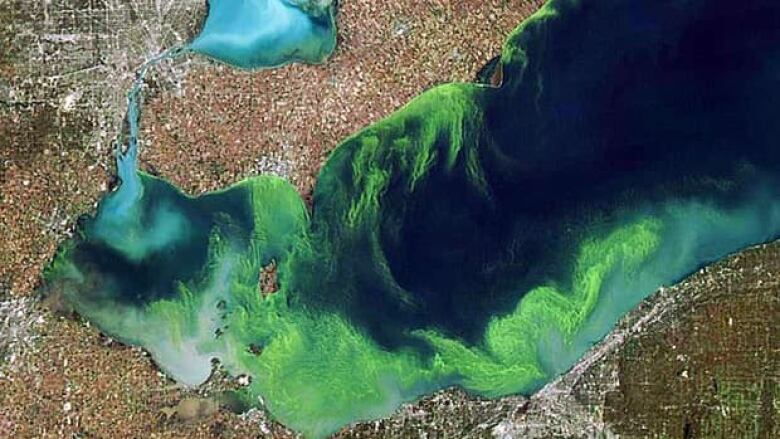Great Lakes experiencing 'new stresses'
Pharmaceutical waste, fertilizers and climate change all new threats to fresh water

An aquatic expert warns that despite improved policies and extensive clean-up, the Great Lakes remain stressed and threatened.
Doug Haffner, the senior Canada research chair in Great Lakes Research at the University of Windsor, saysa number of pollutant abatement programs implemented since the 1960shad a positive impact on the lakes.
"However, we have new issues. The Great Lakes have many different stresses on them right now," Haffner said.
Chemicals of concern
- Cosmetics.
- Paints.
- Electronics.
- Fertilizers.
- Fragrances.
- Disinfectants.
- Pesticides.
He said one newer concern is pharmaceutical waste.
Eighteen months ago, the International Joint Commission flagged "chemicals of emerging concern" as a risk to humans and ecosystems.
"The other factor is climate change," Haffner said.
Warmer water temperatures increase the amount of toxic algae that grows in the Great Lakes. Lake Erie is particularly vulnerable because it's the shallowest of the Great Lakes.
Algae arriving earlier
Haffner said blue green algal blooms are traditionally confined to the summer months, mainly August.
Warm weather, low winds and high levels of phosphorus in the water cause algae populations to quickly increase to form large masses calledalgal blooms.
Last year, during record-setting high temperatures, algae began to bloom in Lake Erie in March.
"Things have changed, definitely. The harmful algae growth has increased dramatically in the last 10 years," Haffner said.
One of the worst years on record came in 2011.
The algae can be toxic and has the potential to enter the drinking water system. Blue-green algae toxins can also irritate the skin or cause damage to the liver or nervous system. The toxins can cause headaches, fever, diarrhea, abdominal pain, nausea and vomiting.
Blue-green algae stinks, contains toxins and chokes off life in the lake.
'Best fishery'
Lake Erie is home to the second-largest fresh water fishery on the planet. But Haffner says it has the highest quality fish on earth.
"It is the best fishery in the world," he said.
Haffner said everyone, not just fishermen, shouldbe concerned. More than 40 million people live around the Great Lakes.
"If people dont eat fish, perhaps they like birds or like to enjoy the beach," he said.
Last year, the IJC, which cannot write or implement policy but instead makes recommendations to U.S. and Canadian governments, made the health of Lake Erie a priority concern between 2012 and 2015.
"The financial impact is important for both countries," said Saad Jasim of the IJC.
The State of Ohio claims Lake Erie generates $10 billion in tourism every year. In 2010, Ontario had more than 73 million tourist visits in the Great Lakes region, injecting $12.3 billion into the economy, according to the province.
"This is also a source of drinking water for people on both sides of the border," Jasim said.
The IJC will meet with politicians in Washington next month.
"We find the governments have been very positive," Jasim said.
Last fall, the Essex Region Conservation Authority and Windsor-Essex County Environment Committee launched an educational campaign about blue-green. It's called Overload: Lake Erie Blue Green Algae.
"Its going to be as reversible as climate change," Haffner said of curbing blue-green algae growth. "Were caught in a web of warmer temperatures and a need to feed ourselves."
There is growing demand to maximize the land's ability to grow cash crops so there is a runoff of fertilizer that ultimately feeds algae growth in the lakes.
"Without major changes in how we address agriculture and climate change, well have drastic events by 2020," Haffner warned. "Other countries depend on us to provide food. If we cant provide food, do you think this will be a stable planet?
"Were much more water dependent than oil dependent. Itd be nice for us as a society to wake up and realize that."












_(720p).jpg)


 OFFICIAL HD MUSIC VIDEO.jpg)
.jpg)



























































































